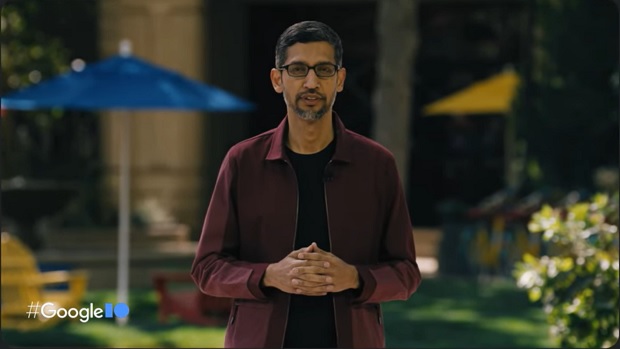Artificial intelligence (AI) was the overarching theme at Google IO, the tech giant’s flagship event which went digital this year with top company officials making their presentations via YouTube livestream.
AI-based initiatives dominated the announcements, particularly for its core products (Search, Maps, Photos) as well as in the fields of research, healthcare, and environment.
“AI advancements are pushing the boundaries of what Google can do. We’ve spent more than two decades developing not just a better understanding of information on the web, but a better understanding of the world,” it said.
For its main products and services, Google announced the following:
- Lens Translate – Updating of the Translate filter in Lens to make it easier to copy, listen to, or search translated text to help students access education content from the Web in over 100 languages.
- Detailed street maps – Google is using machine learning to expand detailed street maps to 50 more cities this year. Detailed street maps show road widths to scale, sidewalks, crosswalks, urban trails, pedestrian islands, and more to give people a better understanding of an area.
- Area busyness — With area busyness, users can understand how lively certain streets or neighborhoods are right now so they can make an informed decision about where to go — or where to avoid.
- More tailored map – Google is tailoring its maps to highlight the most relevant places based on time of day and whether or not users are traveling.
- Live View enhancements – Users will be able to access Live View right from the map, see prominent street labels so they can navigate complex intersections, along with helpful cues that show where they are in relation to places like home, work, or hotel.
- Quick Delete – Google is also introducing a new, “quick delete” option to delete the last 15 minutes of Search history with a single tap from the Google Account Menu.
- Locked Folder – This is a new feature in Google Photos — a passcode-protected space where select photos can be saved separately. These photos won’t show up as friends scroll through a user’s grid or in shared albums. This feature is coming to Google Pixels first, and more Android devices throughout the year.
- Timeline Reassure – Google is also introducing Location History reminders in Maps Timeline. Now, users can see places they’ve visited — a feature they can also turn off right there in their Timelines.
- Password Manager – Google also announced new enhancements to its Password Manager such as the ability to easily change compromised passwords with Google Assistant, automatic notification of compromised passwords, and introduction of new tool that makes it easy to import passwords from files or other password managers.
Later this year, Google said users will also see new types of Memories, which will show up as users scroll through their photo grid, along with new Best of Month Memories and Trip highlights.
The Silicon Valley firm also rolled out Smart Canvas, a new collaboration tool for Google Workspace that features interactive building blocks — smart chips, templates, and checklists — as well as new pageless format in Docs and emoji reactions.
The company also announced high-powered AI initiatives, among them the new “Quantum AI Campus” which will be located in Santa Barbara, California.
“We’re on a path to build a useful, error-corrected quantum computer within the decade. This will accelerate solutions for some of the world’s most pressing problems, like sustainable energy, and unlock new scientific discoveries, like more helpful AI,” the company said.
The “Quantum AI Campus” will feature Google’s first quantum data center, quantum hardware research laboratories, and its own quantum processor chip fabrication facilities.

Google also announced a state-of-the-art, multi-turn dialog system call LaMDA — short for “Language Model for Dialogue Applications” —which adds an important piece of voice assistance or chatbot technology: conversations.
“It’s more capable and flexible than models that have come before it, enabling it to engage in natural conversation. We’re excited about this early-stage research, which we see as an important piece of a larger puzzle that will change the way we interact with technology,” the company said.
The tech titan also bared TPU v4, its newest generation chip designed specifically for machine learning. A TPU v4 pod, it said, can deliver more than one exaflop of computing power (more than 1 quintillion operations per second).
“Many of our TPU v4 pods already run primarily on carbon-free energy, making our TPUs far faster and more energy efficient than generic computers and enabling us to serve more users with less energy,” it said.
Project Starline is another AI-based project that combines advances in hardware and software to enable friends, families and co-workers to feel together, even when they’re cities (or countries) apart.
“To make this experience possible, we are applying research in computer vision, machine learning, spatial audio and real-time compression. We’ve also developed a breakthrough light field display system that creates a sense of volume and depth that can be experienced without the need for additional glasses or headsets,” Google said.




